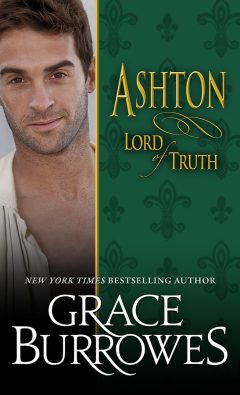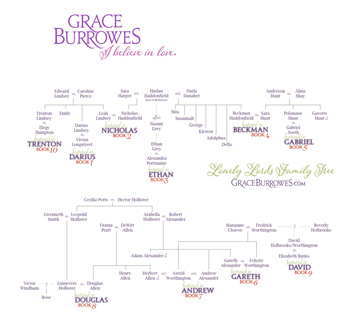Hadrian
Lord of Hope
Book 12 in the Lonely Lords series
Hadrian Bothwell was never an excellent fit with a religious calling, so when his brother bids him come to learn how to run the family estate, Hadrian gives up vicaring and returns to his boyhood home. He’s spent years thinking of Lady Avis Portmaine as the woman he should have fought for, but he finds Avis has become a recluse on the neighboring estate, socially shunned, and more unavailable than ever. If Hadrian wants to win the lady’s heart, he must first win her freedom from a past that will not leave her in peace.
Bonus Materials →
Enjoy An Excerpt







Chapter One
“Must you be so gleeful about your departure?”
Hadrian’s tone carried a hint of peevishness, because in addition to leaving behind the title, the wealth, and the status of Viscount Landover, Harold would be leaving behind him, Hadrian, the only family Harold could claim for the past two decades.
“Yes, I must be so gleeful. I’ve waited years to be this gleeful, Hay.” Harold rummaged inside the vast bowels of the estate desk, then held up a piece of paper on a triumphant exclamation.
“What’s that?”
“My Domesday list.” Harold fairly bounced around the desk, bringing the paper to Hadrian. “These are all the petty instructions I’m afraid I’ll forget. If you read them now, I can decipher them for you.”
Hadrian set the paper aside. “You really are leaving.”
“God willing.” Harold replied, his smile fading. “I pray you won’t hate me for it.”
Prayer. An interesting notion, considering Hadrian had left a vicar’s calling in Yorkshire to heed Harold’s summons.
“You’ll come back and visit?”
“As often as you like, Hay. Give me time to dust off a convincing amount of Danish and settle myself there.”
Sea voyages would lay between them, and sea voyages could be fatal. “You’ll let me know if you don’t end up in Denmark?”
Harold picked up his appropriately named list. “The address, the exact address, is right on this paper. Louise has been given the same information, in case you lose it, which you won’t.”
“I most assuredly will not be asking your… associate’s wife where my brother has got off to.”
“Associate.” Harold leaned a hip on the desk and crossed his arms over his chest.
“What do you call him?” The peevishness was back, closer to the surface, and Hadrian hated it. He also hated Harold’s traveling companion, proof positive the Church was better off without Hadrian Bothwell in any pulpit.
“I call him Andy,” Harold said, but they both know he referred to the man in far more intimate terms. “Or Finch, or sometimes, when he’s being difficult, James Anderson Finch.”
“Finch, then.” A handsome blond fellow with sad blue eyes and a quiet laugh. Also—Hadrian could not fathom how this could be so—the father of two boys and a baby girl.
“Do you resent Andy because I’m going away with him, or resent him because he has the audacity to be close to your one and only brother, Hay?”
Close. The very word made Hadrian shudder. “Both, and because you are intent on traveling so far away.”
Harold plucked a set of keys from the wax jack and tossed them aloft, catching them neatly. “Off I shall sail, leaving you heart broken amid all this wealth and comfort.”
“I don’t want the wealth and comfort.”
Up the keys went again, nearly to the cherubs cavorting about the molding.
“Yes, Hay, you do. You’ve always known you’d be my heir, always had the expectation of the titles, no matter you never traded on them. You’ll be good at this.”
All true enough, damn the man for his honesty. “I will do my duty. What makes you think I’m any more suited to marriage and procreation than you are?”
Harold’s fine blond brows rose in consternation, and this time when he caught the keys, he didn’t toss them again. “You?”
“Oh, for God’s sake—dear Andy is married as we speak, and yet you assume because I was married to Rue I’m eager to trot up the church aisle and full the nursery with my offspring.”
“You were married to Rue.” Harold said, tossing the keys in a desk drawer, and slamming it closed. “Meek, pretty, sweet Rue.”
“You didn’t like my wife?”
“She was lazy.” Harold took a seat behind the desk, looking exactly appropriate there. “Ask your parishioners if Vicar Bothwell’s missus sat at many sickbeds or lying ins. Ask them if she came to call as soon as condolences could be offered. Did she ever entertain a neighbor’s children so the new mother could get off her feet?”
Hadrian perched a hip on the corner of the desk, because they were, after all, to have some difficult, plain speaking. “It’s not like you to pillory Rue posthumously.”
Though Hadrian would listen to Harold’s criticism of Rue endlessly if it would keep James Finch from the conversation.
Harold twiddled a white quill pen, a habit Hadrian had seen him indulge in since boyhood. “You do not approve of Andy; I was not pleased with your choice of spouse either.”
For the love of God, Finch was not Harold’s spouse and never would be.
“You’ve had the good manners to keep this discontent to yourself, because Rue might have produced the Landover heir?”
Abetted by her husband, of course.
Harold brushed the quill across his chin. “You married her, and because she was part of your flirtation with the church, I preferred her company for you to that of some cavalry regiment’s.”
“Good of you.” Hadrian shoved off the desk, because he too, would have preferred marriage to a cavalry regiment for his brother. This sailing trip fit somewhere far closer to the regiment than marriage. “Rue wasn’t that bad.”
Harold set the pen in its stand. “Neither is Andy. I will have this trip, Hay, whether you like him or not, so please like him.”
“I’m trying,” Hadrian replied, dredging up a smile for his brother. Though Hadrian was all but certain his brother and dear Andy were engaging in hanging felonies upon which the Church frowned mightily.
And yet, who better than a former vicar to grasp the need for tolerance among frail and imperfect humans? Who better than a man with only one brother to call his own, to realize the folly of casting aside that brother when he’d all but raised Hadrian?
“Are you asking me to stay?” Harold pretended to study his list, but he was considerate man, and he’d afford Hadrian what fig leaves he could. “You would still have the burden of the succession and the Continent is much more tolerant place for such as I.”
Though what of Andy’s wife, who had borne him three children—the requisite heir and spare among them? How was she to fare during this indefinite travel in search of tolerance and a fine command of Danish?
And yet, the problem was not exclusively a function of Andy’s company. “I know all this, Hal, but I still feel a little like I’m sending you off to war. I can’t protect you when you’re off across the water.”
“Nor can I protect you,” Harold pointed out, and as the elder by eight years, Harold had protected Hadrian from much. “When’s the last time you really needed a big brother, Hay? You’ve been all grown up for some time, and I think you turned out rather well.”
If honesty was all that remained to them, then honesty they would have.
“I need you,” Hadrian said, making a study of the family Bible, which lay open in pride of place on a gate-legged table across from the hearth. “Maybe not the same way I used to, but you are all the family I have, and when Rue died, nobody could have stepped in as you did.”
“I’ll still step in. The mails are more reliable than ever now that the Corsican isn’t a threat.”
“I’ve been thinking about that.” Hadrian kept his voice even, lest he betray that he’d in truth been fretting endlessly, not merely thinking. “You should take some pigeons with you when you leave here.”
“Pigeons?”
Hadrian flapped his hands. “The ones that fly home? Hazelton raises them over at Blessings. Wellington used them and not much besides a bad storm can stop them.”
“I hadn’t considered them, that’s all. It’s a good idea, one of many you’ll no doubt bring to Landover in the coming years.”
Hadrian didn’t bother parrying that thrust. He instead appropriated Harold’s list, for the Viscount Landover had atrocious handwriting, and there would be no deciphering it in his absence.
“What this? Aviary? Apiary?”
“Avie,” Harold said, “Lady Avis Portmaine, Hazelton’s sister, who yet resides at Blessings.”
She also yet held Harold’s affection—in some manner—for she figured near the top of his list.
“What of her? She’s the lady of the manor now, isn’t she? The other three went south, or somewhere.”
“She does run the place,” Harold said, rising from his seat. “She and I are friends of a sort, and I regard it as a neighborly responsibility to keep an eye on her.”
“She has to be quite of age, and she has two brothers.” Hadrian set the list aside, wanting to crumple the thing up and hurl it into the fire. “What is this eye you want me to keep on her?”
“She’s isolated over there, Hay,” Harold said gently. “She remained cordial with me, as I am no threat to any lady, and she needs friends.”
As if being no threat to a lady were an asset—though a vicar was supposed to be no threat to a lady, and that had been a asset. “How does she know you’re no threat?”
“Because I told her. She was relieved, and you’re clergy, or you were, and that means you won’t be a threat either.”
“Of course I won’t be a threat,” Hadrian muttered as he resumed his study of the infernal list. “What is this here, it looks like chocolate, or chandler, or God knows what?”
They spent the rest of the morning deciphering Harold’s penmanship, but each time Hadrian glanced up at the clock, try as he might to focus on the blighted list, all he could think was that they were closer and closer to Harold’s departure date.
And while it might be a rebirth for Hal, who’d struggled along with secretive half measures for years as far as his beloved Andy was concerned, for Hadrian it was yet another loss in a life that seemed to be nothing but a long string of them.
![]()
Since leaving his final church post weeks earlier Hadrian had felt a sense of unreality about his days. Harold leaving was unreal, putting off the vestments and mannerism of clergy was unreal, and resuming life at Landover, where Hadrian hadn’t spent any appreciable time for a dozen years, was particularly unreal.
So he watched his brother preparing to go, and tried not to pout—or brood—with limited success.
One tonic that effectively banished the dismals, though, was a dose of Cumbrian morning air on a pretty spring day, particularly when taken from the back of a fine and handsome steed. Hadrian ordered Caesar saddled—how long had it been since someone else had groomed and saddled his mount?—and prepared to seize the day.
The temperature was perfect, brisk at first, but suited to the exertion of riding. Caesar, well rested from his jaunt home from Yorkshire, was happy to canter along, soft spring grass under his hooves.
Hadrian had brought his mount down to the walk to cool out when Ceasar’s ears pricked forward and his forward progress hesitated.
“Easy, lad.” Hadrian stroked a gloved hand down the horse’s crest, for he’d identified the sound his horse was reacting to. At first he’d thought it was birdsong, high, trilling, and joyous, but as he focused his attention, he discerned the notes of a flute.
A solo flute, rising up on the crisp country air, was incongruous, though it conjured the unbridled exuberance with which earth and spring reunited. Following the sound, Hadrian nudged Caesar up the track, higher, closer to the music. On and on the melody went, swooping, laughing, and caroling along, until Hadrian could see the musician through a thick stand of pine.
She sat on a rock like some kind of wood sprite, tootling away, no written music, just notes and notes and a flashing silver flute. She swayed minutely with her melodies, eyes closed, fingers slipping over the keys. Gradually the music changed, from vibrant rejoicing to a tender, lyrical, and not quite happy melody.
A cradle song, though the flutist rendered familiar melodies new and sweet. When she was finished, she held still for a single moment, then slowly lowered the flute to her lap, eyes still closed.
He ought to slip away. He could, because his horse wasn’t quite visible through the thick, fragrant greenery of the pines, and he recognized the concertmistress now. He did not want to have to introduce himself alone, up here, not far from the scene of her assault.
“Is somebody there?”
Her voice was low, lower than he recalled. He had that thought as he swung off Caesar’s back, and led the beast from the concealing foliage. She wouldn’t appreciate the nagging sense of unseen eyes on her, not where she’d made such glad music.
“An appreciative audience,” Hadrian said. “An impressed, appreciative audience.”
“Sir, you have me at a…. Hadrian?” Her expression, initially guarded, dissolved into consternation, then sheer joy. Why should she be happy to see him, of all people, and so willing—
She was in his arms, a solid female weight thumping into his chest, her flute set aside as she hugged him.
“Oh, you naughty, naughty, man,” she said, laughing, holding him at arm’s length, then hugging him again. “I have missed you so, and now here you are, and you look so bloomingly good, Hadrian Bothwell. You do. You caught me, just as you used to, skipping my lessons and playing truant.”
She stepped back enough to hold him at arm’s length again, leaned in and took a great big lungful of Cumbrian morning air.
“You still wear a positively delicious scent. The wonderful impression you make on a lady’s sense cannot be pleasing to the sober calling of the Church.”
She seemed so… normal. If anything, she’d grown more attractive, but would she view that as positive?
“And you,” Hadrian heard himself say. “You still carry the scent of spring and meadow flowers.” She still had that smile, a curving of her full lips that made a man think she knew wonderful, special secrets, secrets that gave her joy, very possibly secrets related to the fortunate object of her smile.
Except the secrets they shared related to nothing worth smiling about.
“May I hope you were on your way to pay a call at Blessings?” she said, still standing only a step away.
“You may,” Hadrian replied, his vicar’s skills allowing him to offer the kindly lie with convincing smoothness. “Harold is off on an extended sail later this spring, and I was hoping we could send some of your pigeons along with him.”
“I’ve discussed this extended sail with Hal on many occasions.” Avis’s voice became censorious. “I trust you have too.”
Harold had for once put his foot down, politely, of course, and the discussion had been quite limited. “He’s a grown man and I owe him much. If he wants a break from Landover, I’m his man.”
She regarded him with a frankness not many women exhibited, and Hadrian was reminded of many other things he’d forgotten—through significant effort—regarding Lady Avis Portmaine.
Her smile was only the start. When he beheld her smile, he had to admit he’d missed that smile, missed the way it made his heart warm, and had his own lips curving up. She was a bright woman, not only book-smart—French, Latin, Greek, Italian, German book smart—and quick with facts and numbers, but also with intuition.
She was… pretty too, though not in any conventional sense. A little tallish for a woman—the Portmaines were all on the tall side—and dark-haired, as her full siblings were as well. On Avis, that hair carried red highlights, as if some lusty Norseman stalked her ancestry. This wasn’t the pale beauty of the English rose, this was an older, more earthy and lasting sort of beauty, less apparent at first glance, and yet more capable of lingering in a man’s memory.
“You’re a grown man, too,” Avis remarked, apropos of Hadrian’s last comment about Harold’s travel plans. “You had a life with the Church, and Hal has no business calling you from the Lord’s work to hold the reins while he larks about for a few months.”
Of course she would think Hadrian was only here for the nonce. God willing, every gossip in the shire would see Hal’s trip in exactly the same light, until the permanence of Hal’s remove became quietly apparent. Hadrian kept his thoughts silent as he watched her deftly disassembling her flute and packing it into a velvet lined case.
“The Lord’s work in Rosecroft village is was not urgent,” Hadrian answered truthfully. “Not to me, and not to my parishioners.”
“You had unhappy memories there.” Avis draped a cloth over her flute and closed the case. “One can understand this.”
She referred to Rue’s death, and her solicitude left him feeling like a fraud.
“I have happy memories too. But tell me how you go on, Lady Avis. Harold was a fine correspondent regarding crops yields and pounds of fleece, but not much of one for passing along the neighborhood news.”
“That one.” She slipped her arm through his, as if they hadn’t walked home for church together for the last time more than twelve years ago. “Harold was so happy when you took a post here in the North, it’s all we heard about for months. He’s very proud of you.”
Which made one of them. “He’s the best of brothers. Overlooking my flaws goes with the description.”
She peered at him, too perceptive by half, but the moment passed, and Hadrian admonished himself to work on his sincerity. Hal was the best of brothers, regardless of his travel plans or preferred company, and Hadrian was nobody to judge him.
He was out of the judgment business, and glad of it.
“Will you join me for breakfast?” Avis asked. “I rarely have company at Blessings, much less that of someone I’m so glad to see.”
“I would be pleased to join you.” The church imbued a man with surpassing manners, though sooner or later, the past must intrude on his dealing with Lady Avis, and that moment would make all his discussions with Harold pale in comparison. “Riding in this air gives a man an appetite.”
“You always could put away a decent meal, and your gelding looks like a horse who could enjoy a good gallop at any time of day.”
“Caesar is a St. Just horse,” Hadrian said, taking the reins in his free hand. “He’s fit as the devil without being hot tempered.” Rather like Harold.
“And handsome,” Avis added as they gained the track down the hill. “St. Just is the new Earl of Rosecroft?”
“He is,” Hadrian replied pushing a pine branch aside for her. “Former cavalry, as well as a friend.”
“I’m glad you had some friends in Yorkshire. I imagine leading a flock can be a lonely business.”
“Some flocks engender loneliness,” Hadrian allowed, though it has taken him two years to put that label on the emotion his post inspired. “Before I left, I shared quarters with another fellow who’d taken over as vicar from his father in the town he was raised in. Mr. Banks said his lot was not lonely, at least not in Little Weldon.”
Avis dropped his arm, for the path became narrow. “So the Church truly can be one big family? One hopes this is so.”
“I gather it isn’t here?” He was done with church business, utterly, absolutely, and that meant he didn’t have to hear people griping about their vicar’s sermons, or the curate’s inability to patch a church together without funds.
“I do not attend.”
Silence descended as they made their way down the hill, with Hadrian resenting the need to say something. He wasn’t her spiritual authority, not her vicar, not even officially a fellow parishioner yet that she should burden him with this.
“I’m sorry,” Avis said when they reached the bottom of the hill. “It will be like this for us, won’t it? I’ll understand if you want to decline breakfast, and you’re welcome to as many pigeons as Harold can stow on his yacht.”
Hadrian had the sense of having charged into the middle of a deceptively solid looking bog.
They had been doing so well. “Be like what?”
“We will try for cordiality and succeed swimmingly until something slips out amiss, and then all will be awkwardness until somebody tosses out another platitude or social nicety, and while I cannot expect you to forget, I’m so very—”
She broke off and patted Caesar’s neck.
“So what, Lady Avis?”
She kept her back to him, probably the object of bestowing affection on the horse. “I used to be plain Avis to you or even Avie, and now I’m this Lady Avis creature, whom I hardly know, and don’t think I’d enjoy. But I’ll hush now, and thank you for your escort.”
She reached around him to retrieve her flute case from where he’d tied it to his saddle, but he reached it first, keeping possession.
Because they did have a past, and it included more than the scandal that had befallen her, and because he’d left the clergy, which meant his only real status was that of a gentleman.
“When a neighbor extends a hungry fellow an invitation to share a meal, that fellow does not expect the invitation to be retracted.” He winged his arm at her and kept his expression bland.
Her expression went from puzzled, to briefly mutinous, but she took his arm.
“Your gardens are impressive for so early in the season,” Hadrian said as they approached the grounds behind Blessings. “You must tell me about them.”
She accepted that challenge, pausing in her recitation only long enough for Hadrian to hand Caesar off to a groom. Then she fell silent, apparently content to stroll with him up to the stately expanse of the Blessings residence proper. The family seat was a huge old place, befitting a wealthy earldom, and yet to Hadrian, it had never seemed cold or lifeless, particularly not when the grounds were bursting with daffodils and tulips, and all manner of flowering trees.
“Blessings looks to be thriving. Your landscaping is sumptuous.”
“Winter is so long and cold here, I’m usually desperate for color and beauty by spring, and each year, I grow a little more ambitious.”
“These beds look similar to some we have at Landover. Did you do ours as well as your own?”
“I gave Harold my designs, because he complimented the patterns. Harold is the only man I know who isn’t too proud to admire a pretty flower.” She went on, describing what species went well together and why, but Hadrian was still trying to puzzle out their little exchange on the hill. He hadn’t precisely been avoiding Blessings, but he had been… reluctant, to see Avis.
A bond still stretched between them, intimate and precious, and intensely private, but not altogether comfortable for either of them. Or maybe, he thought as she chattered on, there had been a bond, obliterated now, worn away by time, maturation, and the experiences that made up their separate lives.
“What is your favorite flower?” Hadrian asked, because he wasn’t quite ready to closet himself with her over kedgeree and toast.
“I love them all,” Avis said easily. “From the first crocus to the last chrysanthemum, and everything in between. What about you?”
“I like purple flowers. Purple and blue, irises, pansies, bluebells, periwinkle, violets and so on. We can’t quite replicate that palette of blues, lavenders, and purples God has given to the flowers and I never tire of admiring it.”
“You speak as a man of God, but you’re right. The colors and scents and pleasing shapes of flowers are God given, however fleetingly.” He let her go on, and occasionally stop to pull off a spent bloom. The morning air was warming up, and then too, wandering around her garden allowed him time to adjust.
This Avis Portmaine was pretty, and vital, and confident. She hugged him, and when she wasn’t making veiled allusions to their past, she made idle conversation with breezy humor. In some ways, Hadrian resented her, for she’d replaced a quiet, withdrawn young woman who’d needed him when he’d never been needed before. But that young woman hadn’t entirely faded either, as it had been her, the victim of an unspeakable crime, who’d made that comment about it being ‘like this’ for them, and invited him to depart.
He was no longer eighteen and clueless how to go on—a vicar also dealt with tragedy and ill fortune in quantity. Nor was he willing to give up a decent breakfast, when it would appease the convention that said he should call upon his closest neighbor now that he was home.
“Did you get my letter?” she was asking, and Hadrian had to cast back to recover the sense of her words.
“I did. Your condolences were much appreciated.”
“You miss her?”
“I do,” he said, because that was expected, then, “It’s been two years, and one adjusts.” Because that was honest.
“One does. I will miss Harold sorely; he’s been a dear friend.”
“Also a wonderful caretaker of our lands. He’s leaving Landover in my hands when I’ve never had responsibility for more than a vegetable garden.” That exercise had only been enjoyable when compared with chairing Pastoral Committee meetings.
That thought sent another gratuitous spike of irritation through Hadrian’s morning, and a wave of weariness.
When would he settle? When would he let his old life go, and come to terms with whatever this new life would be?
Lady Avis bent to snap off a dead daffodil gone a brown and wrinkled. “Your brother loves Landover, so we must conclude he doesn’t simply want to travel, he needs to.”
Oh, delightful. Harold had not merely a friend and Lady Avis, but an advocate for his damned schemes. Hadrian trudged back into the conversation, trying not to let the effort of making idle talk show in his tone.
“What do you hear from your brothers?”
“Benjamin is in London, keeping a discreet eye on Alex, who has threatened to leave her post in Sussex. Wilhelm is off in Sweden, I think, or Norway by now, and will no doubt be wandering the north until the end of summer.”
“What does he find to do up there?”
“Who knows. It’s time and past he took a wife and settled down, but we’ve Viking blood in our veins, and Vim must wander and call it trading in various goods.”
Hadrian was perversely cheered to think Avis also struggled to keep her balance. “You say Lady Alexandra is in the south as well?”
They’d reached the house, and Avis paused on the bottom step of a side entrance, and turned to survey her gardens.
“She hides, Hadrian. She is an heiress and pretty, and yet she has wasted years governessing at some medieval hall on the southern coast. Her charge’s mother has remarried, though, and this means Alex will soon be off again, like a tinker without a home or coin of her own.”
The past abruptly swooped close to conversation again, a raptor hungry to pounce on any stray comment, any veiled allusion.
“Lady Alexandra might enjoy being a governess.” Though Hadrian couldn’t reconcile that calling with the outspoken, bookish young lady he’d known.
Avis waved a hand and led the way into the house. “Spare me your manners, Hadrian. Alex needs children of her own, a place to set down roots, and to build a life.”
Hadrian followed her inside in silence, for Avis was likely the one hiding, the one lacking roots, the one…. But she would not want children, would she? Would not be able to endure the conceiving of them, in all likelihood.
“When he’s not keeping an eye on Alex, how does Hazelton keep himself out of trouble?” The question seemed safe enough, though Hadrian’s store of safe topics was running low.
“Benjamin is very close-mouthed about it. I suspect he’s a high class snoop.”
“A what?”
She opened the door to a small parlor, one Hadrian didn’t recall from his youth. The room was defined by the French doors running the length of its outside wall. Sunlight flooded in, bouncing off pale hardwood floors, ricocheting into a long mirror on the opposite wall, and vaulting to the high arched ceiling. A half dozen glazed crocks sported forced bulbs—lemony daffodils, periwinkle blue hyacinths, blushing pink tulips. The furniture was comfortable and upholstered or finished in pale colors, and the whole sense of the space was one of warmth, light and comfort.
“Benjamin is an investigator for hire,” Avis clarified. “You like my parlor?”
“I’ve never seen a place quite like it.” Different wasn’t the right word, wasn’t a positive enough word.
“When I’m not designing my gardens, I’m turning my sights on the house itself. I spend a great deal of my mornings here, or out on the adjoining terrace.”
“It’s… peaceful,” Hadrian replied, but peaceful wasn’t quite right either. To step into this room was… a relief. Darkness would find no purchase in such a room, neither would loneliness. Light poured in and came to stay, bringing with it warmth, and cheer.
“The tea trolley should be along soon.” Avis took a rocking chair, leaving Hadrian to choose an end of the cushioned sofa. “Tell me about leaving the Church. Taking off your collar must be quite an adjustment.”
“I haven’t really left yet. I’m still nominally entangled with my last congregation.” And why was that?
“Over near York. St. Michael’s of the Something.”
“Sword, though nobody’s quite sure where the moniker came from. The valley is pretty, not that different from our terrain here.”
“Not as dramatic,” Avis suggested. “The hills don’t range quite as high, and they haven’t the lakes.”
She was reported to remain close to Blessings—very close. “Have you been over that way?”
“I have not, though Harold described it to me. He said it’s lovely.”
“The winters are no better than ours,” Hadrian said, wishing the tea tray would arrive so he could dispense with his two polite cups, have a nibble of toast, then be done with this obligation. “The summers are quite fine.”
“The summers are too short. You’ve avoided my question.”
Apparently without success. “About?”
“Leaving the church, Hadrian. You’ve been ordained, what…Eight years, and now you must leave it behind.”
Why was she the first person to ask him about this?
“I choose to leave it behind,” Hadrian said, though it wasn’t much of a choice, not when Harold and his… friend had been growing desperate. “I’ll miss some aspects of it.”
“Such as?”
He was spared an immediate reply by the arrival of the tea trolley, and it was a trolley, of a size that tracks in the hallway wouldn’t have been amiss.
“Shall we serve ourselves?” Avis asked. “I’ll pour, you make yourself a plate, and think up a suitable reply to my question.”
An astute woman, indeed.
Chapter Two
“What I miss about the church.” Hadrian said, as if announcing a sermon topic. He chose a slice of buttered toast, a portion of omelet, a thick slice of ham, and—why not?—another slice of toast while arranging acceptable and honest thoughts into mental categories.
“I make mine into a sandwich,” Avis said, as he assembled his meal. “We’re not at table so feel free to do the same.” She passed him a cup of tea with both cream and sugar, as he preferred it, and then suited actions to word by building herself a breakfast sandwich.
Hadrian took a bit of his own sandwich. “I don’t think I’ve done this since university—it’s a fine way to consume breakfast.”
“Well, we have plenty and you’ve been riding, so eat up.” Avis took a nibble of her sandwich. “What do you miss?”
An astute, tenacious woman.
“A few people,” Hadrian said putting his sandwich down. “Not many. I do miss the sense of rhythm about the life of a vicar.”
“What sort of rhythm?”
“The days have a rhythm, as one prays at certain times, and visits, and has visitors, and works on the sermon, and prays some more.” Or one was supposed to.
“Comfortable but boring?”
“At times, as with anything.” How bored was Harold, watching the seasons change year after year at Landover, while feigning contentment? “The weeks have a rhythm, too, punctuated by the service on Sunday, then a day or two to regroup, and then the next service looms. The liturgical year has a rhythm, with high holy days, and conferences with the bishop and so forth at regular intervals. I could see my life unfolding in a certain sequence, and it wasn’t unbearable.”
Nor was it meaningful, though, and that—the sense of empty rhythm—had begun to wear on him.
“What did you do for enjoyment?” She passed him another sandwich, his first having somehow disappeared.
“I enjoyed….” He fell silent, staring at the second sandwich.
Another bog but less treacherous, for he’d had time to ponder this.
“I enjoyed the sense of being useful,” Hadrian said. “Of offering some comfort and solace to those in greatest need, and of making remarkable some particular moments of joy.”
“Weddings?” Avis guessed.
“And christenings. Those even more than weddings.”
“I’d forgotten you’d be involved in those.” Avis topped up their tea cups, but of course, babies might be something she’d want to forget. “Have some fruit.”
Oranges sat in a blue crockery bowl along with hothouse strawberries.
Hadrian plucked a succulent red berry from the bowl. “You raise these?”
“I do. I’ve grown self-indulgent in many regards, Hadrian, the gardens and greenhouses being only one example.”
Self-indulgent, and isolated. Though maybe an excess of privacy was another indulgence. “Your music being another?”
She grinned at him over her tea cup, and the grin lightened everything—the mood, her face, Hadrian’s mood, the room.
“Of course. I will ask that you leave me at least three of those strawberries, though I’ve been enjoying them all week, and likely will for another week at least.”
“Three.” Hadrian selected the largest three and set them on her plate, then made free with the rest. “These are delicious. I haven’t had any since last year.”
“You didn’t garden over in Yorkshire?”
“I did not.” Hadrian paused in his consumption of the strawberries. “The congregants were an odd lot. I was to buy my produce from them and use their choice of horse for my transportation, and their choice of housekeeper for my vicarage.”
“This sounds more like being a child at the whim of the nursery staff than it does being the spiritual leader of a community.”
She’d put words to something he’d avoided admitting even under the heading of honest thoughts.
“All clergy must resign themselves to a paradox,” Hadrian said, eyeing a particularly large strawberry. “You are a leader, but in such ways that nobody is offended, threatened, imposed upon, or otherwise inconvenienced and not just because you are a shining example of diplomacy, humility, and self-sacrifice, but also because the folk you’re leading stock your larder, shingle your roof, and if they’ve a mind to, write to your bishop.”
“What would your friend say about this, the one who grew up among his parishioners?”
“He’d say get the hell out of the church.” Hadrian set the strawberry down. “I’m sorry, that was not well phrased.” He rose, but caught the expression on his hostess’s face.
Not shocked. Smiling.
“You were intent on joining the military,” she said. “Subdue savage heathen and grow rich in foreign climes. Maybe you were the one who suffered the subduing.”
“Suffered nominally, perhaps.” Though others suffered far worse fates. “But subdued, apparently not.”
A cheering thought, which had been in short supply lately.
“Good for you, Hay Bothwell.” She smiled again, that soft, wonderful smile, and the word alluring popped into Hadrian’s head. “Never admit defeat.”
“Is that the Portmaine motto?”
“It’s my motto,” she said, getting to her feet and again slipping her arm through his. “Let’s walk off a little of our meal, shall we?”
“If you like.” He let her lead him from the bright little parlor, up to the Portmaine portrait gallery, which looked out over the sprawling back gardens.
“I do this with Harold,” Hadrian said. “When I’ve been gone we spend a few minutes the next morning greeting the ancestors.”
“A ritual. One with meaning.”
“Yes.” Her insight pleased him, tremendously, because so many of the supposedly holy rituals had felt devoid of meaning. Theatre conducted to facilitate a social gathering for the village, nothing more.
“Between ritual and routine lies a word of difference,” Avis said, pausing before the first viscount Hazelton. “Did you know he had twelve children and they all lived to adulthood?”
“He was lucky, or his children were.” He would have missed her expression, except he turned his head to study the old fellow in his hose and collar.
Avis Portmaine did want children, desperately. Good God Almighty. Longing was there in the look in her eyes, the lines of sorrow tracing her mouth, and the resolve in her spine.
Hadrian strolled her past the viscount. “I’ve considered it fortunate that I did not have children with Rue. They would be struggling along with only me for a family and any son would be burdened with expectation of Harold’s title, and yet he’d be simply a clergyman’s son, and it would be… difficult.”
“One could see it thus.” Avis considered the next viscount’s more austere countenance. Her gaze shifted then, brows knitting as she glanced out the window. “I wonder where Fen has been. He was supposed to meet with his shepherds this morning.”
“Fen?”
“Ashton Fenwick, our steward,” Avis said. “He’s ridden out this morning I suppose, perhaps enjoying the air as you did.”
“But?”
“But the man is in the saddle more days than not. He has no need of an aimless ride, and as spring advances, we need to get organized.”
As Hadrian needed to get organized. “For?”
“Lambing is almost done. Before we can drive the sheep up to summer pastures, we must get through shearing and dipping, and all that must go on while plowing and planting are tended to, and foaling, and calving, and we often work in concert with Landover’s crews on such things but Harold has been distracted this year.”
“I am not distracted. I am, rather, terrified of the responsibility my brother is tossing onto my shoulders.”
“Summer would have been a better time for him to go, but fear not, as we’ll look after you.”
They stood by the window, the morning light bringing out the rich red highlights in Avis’s hair while out in the stable yard, her steward dismounted and handed his horse off. Hadrian could see the faintest of fine lines radiating out from her eyes, lines that would turn into laugh lines, and crinkle with humor when she was amused.
“I’ve a favor to ask.” Hadrian said, because in some regard, he did need looking after—and so did she. “Come to services with me this Sunday.”
She wrinkled her nose. “Hadrian, I do not in truth enjoy attending.”
“You think I will?” He tugged her down onto a cushioned window bench and kept her wrist encircled by his fingers lest she flee before he’d wheedled his boon from her.
She studied their hands. “You’re a churchman, or the nearest thing to it, and Hal will go with you. If you’re worried about forgetting names, or not recognizing—”
“I’m not a churchman,” he said. “I’m not sure I ever was, and yet I’ll be an object of interest, and the local vicar will be…. friendly, but cautious, and then some damned body will spout a piece of Scripture, and someone else will reply with another little snippet, and all the while, they’ll be watching me, to see how I manage, as if I’m the former but aging champion in some scriptural game of lawn tennis.”
“You want me to be your decoy?”
“Not a decoy, no…Well, perhaps, or at least a distraction. Do you truly never attend?”
“I’ve been to some weddings. Occasionally I go at Yuletide to hear the children sing. I avoid Easter, though I often supply the flowers.”
“I can make sure Hal comes along, and we’ll have strength in numbers. You’ll do it, then?”
He couldn’t quite read what passed through her eyes, but she squeezed his fingers, then slipped her hand from his.
“Just this once Hay Bothwell, and you are not to let me out of your sight.”
“Nor you to take your eyes from my defenseless little self. Harold will be of no use whatsoever, he’s so distracted with his upcoming travels.”
They spent a few more minutes discussing the arrangements, and then Hadrian made his escape, Lady Avis still on his arm as they approached the stables. She swung along beside him, matching his stride easily.
“Fen!” She dropped Hadrian’s arm to hail a great dark brute of a fellow emerging from the stables. “Come meet Lord Hadrian. He’ll hold the reins at Landover in Harold’s absence.”
“My lord.” Fenwick barely inclined his head, as a dark eyebrow swooped upward. “You’re the vicar, aren’t you?”
“Former vicar. I’m also Harold’s heir and he’s asked this of me. I will look forward to working with you this spring.”
“Will you now?” The eyebrow lowered and humor flashed in dark, dark eyes. “Or what?”
“Or I’ll turn you over my knee, Ashton,” Lady Avis scolded. “Stop strutting around in the barnyard. Hadrian is an old and dear friend, as well as a neighbor. You’re to treat him like family and none of your nonsense.”
Fenwick sighed mightily. “Lady Avis is forever threatening. I’ve yet to grace this knee of hers, not even once.”
“Because you’re all bluster, while I mean every word I say.”
“Is this the vicar’s beast?” Fenwick asked when Caesar was led from the stables.
I am not a vicar. “He is. I bought him from St. Just before leaving my last post.”
Fenwick gave a low, appreciative whistle, and ran a hand down the gelding’s neck. “We’re in the presence of royalty, Lady Avie. I’d heard St. Just moved up north, but I didn’t know he had any stock with him.”
“A few youngsters with more to follow this year,” Hadrian said, willing to let his horse be admired by all comers. “You’re welcome to take him out some day. He’s a perfect gentleman.”
“And up to my weight,” Fenwick said, eyeing Caesar’s muscular flanks. “Lady Avie, can you spare your vicar for a bit? I’ve a mind to try this beast. St. Just mounts are legendary.”
“You were supposed to meet with the shepherds, Ashton.”
“Already did, my lady.” Fenwick hunkered and ran a hand down a foreleg. “You could come with us, keep an eye on me and make sure your vicar doesn’t come to any harm.” He straightened and frankly leered at Avis, whose mouth thinned with impatience.
“So I can watch the two of you race neck or nothing over rabbit holes like a pair of heedless boys? Thank you, no. When will the sheering start?”
They would have too—raced over bad terrain for stupid, masculine reasons. Hadrian resisted the urge to stick his tongue out at Fenwick.
“Bothwell’s herds spent more time on the hills than ours, so we should take off their wool first,” Fen said, all business. “A couple more weeks to let the weather moderate, and finish up with the foaling, and we’ll be ready to start, assuming the vicar agrees?”
“The former vicar,” Hadrian, quite pleasantly. “I’ll likely agree once I’ve conferred with my brother on the matter. Is that your horse?”
A wizened groom was leading a big, rawboned chestnut gelding from the stables.
Fen smiled at his horse the way some papas smiled at the first born sons. “You see before you Handsome Folly also know as Handy, who like his owner, is a fellow of hidden depths, and unfaltering loyalties.”
Oh, for God’s sake.
“He’s as loyal to his bucket of oats as you are to your mug of ale,” Avis scoffed. “Handy is less likely to be cutting up anyone’s peace with his blather. Gentlemen, I’m off, for I never did finish my strawberries. Hadrian.” She went up on her toes and kissed his cheek. “Lovely to have you home. I’ve missed you terribly, so call as often as you can. Fen, behave.”
“Yes, yes.” Fen waved his riding crop in circles. “Or over your dainty knee I will go. I’m trembling.” Avis snatched the riding crop from his hand, whacked him smartly on his backside, passed the crop to Hadrian and strode off.
“I adore that woman,” Fen said, watching the view of her retreat. “I do fear the sentiment is not mutual.”
“If your adoration is always so respectfully expressed,” Hadrian said dryly, “then one can hardly wonder why.” He passed over the crop, shifted to check Handy’s girth, and put the stirrups up a hole while Fenwick let Hadrian’s leathers down a hole.
For all his banter and charm, Hadrian’s first impression of Fenwick stuck with him: A big, dark brute.
Who called his employer Lady Avie, and got his behind smacked for his cheek.
“Where shall we take them?” Fen swung up and patted Caesar’s neck.
“I haven’t done much riding since coming back.” Coming home. “If you don’t mind spending time on Landover’s side of the property line, there used to be a nice trail through the deer park.”
“Lay on, MacDuff.” Fenwick gestured with his crop, then fell in beside Hadrian and Handy at the trot.
They rode along in silence, Hadrian using the time to explore Handy’s responses. Handy was not as elegant as Caesar, and could not boast youthful exuberance, or a perfect distribution of parts, but he was exquisitely trained.
“He’ll do one tempis, won’t he?” Hadrian asked.
“When he’s warmed up. How does a lowly vicar know of matters equestrian?”
“I thought I would become a Dragoon at one point. I spent all my summers tearing around the neighborhood on horseback. Harold always saw to it I had good horses, and what boy doesn’t have at least a phase of horse madness?”
“What rich boy. How does one go from a horse mad dragoon acolyte to a lowly vicar in the West Riding?”
“One grows up,” Hadrian said shortly. “You’ve pranced around enough. Let’s see what your boy can do between here and the property line.” He touched his heels to Handy’s sides, and the gelding gave a mighty, happy leap forward, followed by a flat out, breakneck gallop over the relatively level ground before them.
Caesar put his heart into it, and came level with Dusty’s shoulder, but the older horse was the more wily—knew how to conserve his energies, when to leap and when to swerve—and beat Caesar by half a neck when they flew over the stone wall separating Blessings and Landover.
“Good lad.” Hadrian patted the horse soundly, and damned if the beast didn’t break into a little display of piaffe. “Pay attention, Caesar, my boy. You want to grow up to be just like him.”
“While I want to live to tell about it.” Fenwick groused, but he was patting his horse too. “Handy likes a good romp, and I tend to forget that.”
“What about you? Do you share his fondness for a good romp?”
“Will you counsel me to temperance, Vicar?” The humor in Fenwick’s eyes took on an unfriendly gleam.
“You are very familiar with your employer.” Disrespectful of her, almost.
“So you’ll join the pack of jackals hereabouts who attribute all manner of venery to her, will you? I am disappointed, Vicar, as I did so like your horse.” He was out of the saddle and putting the stirrups up a hole.
“How long have you known Lady Avis?” Hadrian asked.
“Long enough to know your pontificating company is not fit to lick her boots,” Fenwick said with a great pretense of pleasantness. “That woman has been through more misery than you can imagine, Bothwell, and she’s weathered it all—every bit of it—on her own. Her brothers are off larking about all over creation while Avie tends the family seat, and her sister is too busy poaching other people’s children to bother coming north for even a week or two. Get off my horse, now.”
“So you can put out my lights?” Hadrian crossed his wrists over the pommel and regarded Fenwick from Handy’s back. “I think not.”
“I can drag you out of the saddle, but I’ll withhold the beating you deserve because Avie would not appreciate the talk. Know this, though: When, like the rest of her neighbors, you don’t come calling ever again, I will still be her friend and honored to serve her in any way I can.”
Now this was interesting. “By finding me in a dark alley some night, and beating me to a pulp then?”
Fenwick gave Caesar a final, gentle pat. “If you’re not off my horse in five seconds, then I’ll swat this one on his handsome quarters and leave you to walk home.”
Hadrian swung down. “I did not impugn the lady, not intentionally or otherwise, Fenwick. I asked a question, rather, pertaining to you, and here you are, spouting violence at me on Bothwell land.”
Fenwick had made the mistake many men did, of assuming vicars sprang out of whole, pious cloth the day they took holy orders, no schoolboy scraps or university fisticuffs to hone their violent abilities.
“You asked if I enjoy a romp, your holiness. I am a healthy male without attachments. You may draw your own conclusions.”
Fenwick snatched Handy’s reins and would have swung up without bothering to let the stirrups down a hole, but Hadrian spoke slowly and distinctly, as if reciting a prayer.
“I was the one who found her.”
Fenwick snorted. “Found her what? Languishing away here in Cumbria?”
“Twelve years ago,” Hadrian said. “I was the one who found her, not two hundred yards over that rise, bruised, bleeding, half naked and incoherent, her hands so cold they’d freeze your soul. If you trifle with her, I will kill you.”
The words came out of Hadrian’s own mouth, he heard them, and he meant them, but he had no idea where they’d come from.
Fenwick paused in his fussing with his stirrup leathers. “You mean this. You’d bloody kill me.”
“In a heartbeat, and Hal would prime the gun for me.”
Fenwick finished adjusting his equipment while Hadrian gloried, gloried in a purely violent impulse. “Mount up, Saint Peter. We shouldn’t let the horses stand around after they’ve had a good run.”
They ambled along in the dappled sunshine of the Landover home wood, Hadrian’s gratifying bout of temper cooling as the horses walked out.
“Avie doesn’t talk about it,” Fenwick said. “Her past is always there, in what she says, what she doesn’t say. It’s there when the neighbors talk about her and in their silences.”
“She’s ostracized?”
“Of course. She allows it, as do those worthless brothers of hers.”
Avie’s brother were not worthless. They had left her in peace at the family seat at her own insistence. “She was the victim of a heinous crime. Why on earth would she be castigated for that?”
“She was engaged to Collins at the time,” Fenwick reminded him. “Some say Collins should not have been run out of the country simply for anticipating the vows. What could be more encouraging to a lusty young man than when a lady accepts his suit? She is regarded by some as a tease, a strumpet, a high born lady who could not uphold the standards of conduct attendant to her birthright, and so forth.”
Regarded by some was bad. A single dedicated gossip could ruin a woman’s reputation, and “some” could ruin her life. “I had no idea.”
“How could you? You were too busy ministering to the deserving faithful.”
While Fenwick was becoming protective of his employer.
“Harold said nothing.” Though, Hadrian hadn’t exactly asked about Avis, had he?
“Harold is a title, and such an inherently good man, nobody thinks to include him in the gossip. Besides, he’s known to be great friends with the Portmaine family, generally, and his loyalties would not brook slander.”
“Neither will mine. Does everybody regard Lady Avis in this unkind light?”
“Of course not. Though all it takes is one disdaining look, one little sniffy aside, and Avis retreats, until circumstances compel her to venture forth again.”
Retreat was all bullies needed to inspire them to greater viciousness, this was true in the churchyard, the school yard, and everywhere in between. “Benjamin and Wilhelm tolerate this?”
“Benjamin and Vim are the highest ranking title and deepest pockets in the shire, respectively,” Fenwick said patiently. “Nobody would treat her amiss in their presence, and neither one of them will look any further than the surface where their sisters are concerned.”
“Because their sisters have convinced the entire world they don’t want anybody’s probing.”
“I can’t speak for the governess. Avis is very clear her brothers are not to worry for her, so they’ve given up trying.”
“Good God, what have I done?”
“Beat me on my own horse?”
Yes, handily. “Not that. I’ve coerced Lady Avis into attending services with me this Sunday, and the church yard is the very last place she’ll be comfortable.”
Fenwick drew up at the edge of the deer park and regarded Hadrian in the brilliant sunshine. “Why’d you do it?”
“I thought I’d be doing her a good turn. Getting her off the property, out among the neighbors.”
“Fair enough.” Fenwick nudged his mount along the fork in the trail that turned toward Blessings. “But then we must ask ourselves, why did Lady Avis agree to go with you?”
![]()
Hadrian had seemed so lonely, so alone, holding her hand in the cool morning sunshine of the portrait gallery, the Portmaine ancestors silently looking on. Avis should never have agreed to attend services with him, never fallen for his pretty words, or his charming smile, but the idea that she could do something for him—for him—had been irresistible.
He was irresistible, exactly as he had been twelve years earlier, a handsome youth on the cusp of truly attractive manhood. She’d adored him then, even before Hart Collins had assaulted her, and then after… Hay Bothwell had saved her life, her sanity, and her soul, just as he’d also broken her heart.
“You look preoccupied this morning.”
Lily Trostle, Avis’s companion, studied her from the parlor doorway.
“The morning has been busy. Fenwick met with the shepherds and is off to confirm shearing plans with Landover, and I tarried too long on my constitutional and haven’t started on the correspondence yet.”
“It’s a pretty day.” Lily advanced into the room. “You can be forgiven for spending some of it out in the fresh air, though wandering on your own will never be a good idea.”
“I didn’t leave Blessings, and I stayed within shouting distance of the stables.” And you are not my gaoler.
“If you say so.” Lily’s tone was diffident, not quite deferential, nor would Avis have wanted it to be.
“Are those menus?”
“I went ahead and brought them up.” Lily passed along the papers in her hand. “Cook will be asking and it’s Wednesday.”
“I’d like to have the Bothwell brothers over for Sunday dinner.” Avis leafed through the menus and shuffled Sunday’s to the top.
“Brothers? Do you mean Landover and Lord James?”
“Lord James was Harold’s guest,” Avis explained. “Or he often has been, but no, not Lord James, but rather, Hadrian Bothwell.”
Lily took a seat in one of the rockers. “I’ve been here nearly ten years, Avis, and I never knew Landover had a brother. Let me guess, this brother has eight sons and that explains Harold’s unwillingness to marry.”
“No sons.” Avis scratched notes on Sunday’s menu to add two guests to the number expected. Lily had been with her only seven years but somehow that had started equating to a decade. “Hadrian Bothwell is ordained and a widower. Shall we have rice or potatoes?”
“Rice. More exotic than sorry old spuds.”
“But potatoes lend themselves so nicely to cheese.” This was what her life had come down to—choosing vegetables, and hoping her dinner invitation would not be politely refused.
“So it’s the brother we must find a wife for?” Lily prompted.
“Hadrian is quite capable of finding his own wife.” As he had proven handily. Avis wrinkled her nose, second-guessing her selection. “Worthy vegetables are such a challenge this time of year.”
“A viscountcy is flirting with escheat just next door, and you are worried about vegetables.”
“Hadrian and Harold are both quite young enough to have large families yet. I hardly think ruin is lurks around the corner.”
The words were out of her mouth before Avis realized how they’d sound, and then they hung in the air, putting that awful, pitying look on Lily’s pretty face.
“Ruin seldom announces its intent to call,” Lily said quietly. “Much less its desire to become our nearest neighbor.”
“Potatoes,” Avis said. “Baked with our own cheddar and the earliest chives we can find.”
Lily rose, the pity still in her eyes. “That sounds delicious. You’ll bring those back to Cook?”
“When I’m done with them, and you will join us for luncheon on Sunday, Lily Trostle. I won’t be left to manage two hungry fellows on my own, much less three.”
“Three?”
“Fen usually joins me on Sunday.” Which Lily knew very well. “I do so enjoy tormenting him over his manners.”
“Avis….”
Avis rose as well, abruptly tired to her bones with old arguments and old lectures that always rang loudly with ‘for your own good.’
“Fen is my steward, and he’s the next thing to family, and of course I will confer with him from time to time.”
“But at table? He’s too flirtatious by half, which only fuels the worst gossip.”
“My own staff know better than to gossip, or they had better. Fen flirts with everybody, so don’t borrow trouble.”
“No, Avis,” Lily said, “he does not flirt with everybody.” She let the implications sink in with a meaningful glare at Avis, then picked up her skirts and left the little parlor.
Chapter Three
“Ashton Fenwick!” Harold extended a hand, his smile open and genuine. “When did you get back?”
“Several weeks ago.” Fen returned the handshake. “Certain neighbors have been too preoccupied to bother noting my august presence.”
“I’m noting it now. Winter in the south seems to have agreed with you.”
“It usually does. Look what I found wandering the property line and in need of escort home.”
“My errant baby brother.” Harold grinned hugely, out of all proportion to the trite conversation. “He went missing from the breakfast table, and here I thought you’d gone back to bed, Hay.”
“I took Caesar out. Fenwick wants to finalize his plans for the flocks, and I thought your imprimatur needed on such a serious undertaking.”
“One hesitates to point it out, Bothwell.” Fen’s dark eyes were dancing again. “Aren’t you the good shepherd in the family?”
“Stow it, Fen.” The warning came from Harold, sparing Hadrian the effort. Fenwick rode like a demon, and he was protective of Avis, which ought to be marks in his favor, but Hadrian still felt a rankling unease around him.
Which was probably how Fenwick wanted it.
“I’m on my way to the kennels,” Harold said. “Can we talk sheep over a morning visit to the hounds?”
“Avie said you were dispersing your pack,” Fen said as they moved off. “What’s afoot, Landover?”
Hadrian listened while Harold did a creditable job of explaining about crosses and traits and reasons why a man might want to start all over on his breeding program—credible tripe, the lot of it. Harold was finding homes for his hounds very likely because he didn’t intend to come back. The knowledge made his eventual departure so much more real. Hadrian felt a pressing need to kick something.
“You’re not inclined to stay your brother’s hand in this?” Fenwick asked Hadrian. “He has the best pack this side of Ireland.”
“I do not ride to hounds,” Hadrian said, “and were I inclined to start, I’ll be so busy in Harold’s absence, my first outing would have to wait until the hounds were ready to pounce on me rather than old Reynard.”
“You’d make a meal,” Fen allowed, “but surely, you’ll not allow this handsome fellow to leave the place?” Even from his considerable height, Fen didn’t need to squat to pet the dog in question.
“Hamlet comes with me,” Harold said, fondness in every syllable. “We’ll visit his relations in Denmark, after all, or at least I hope to.”
“Do they still have boar hunts there?” Fenwick asked. “I thought the Danes bred his kind for large game.”
“The Danes, the Germans, and noble courts throughout Europe,” Harold agreed. “Also for companionship and protection, and just about every other fine quality in a fellow.”
“Except fine fellows don’t generally drool, chew up your best boots, and get hair all over the rugs and sofas.” Fen offered that litany as he continued to pet the great beast, whose adoring gaze never left Harold. Hadrian begrudgingly agreed with Fen, but promised himself he wouldn’t make a habit of it. The dog, generally termed a Great Danish hound, was the most recent in a succession of his kind that Harold considered more pet than anything else.
Landover had sported dogs like Hamlet as far back as Hadrian could remember—stinking, drooling, and creating a great fuss when they decided to bark at some hapless rabbit.
Good God, was he even jealous of his brother’s dog?
Harold paused some moments later in a litany of canine begats and out-ofs worthy of a book of the Old Testament.
“You’re wool-gathering, Hay, though considering the topic, probably appropriate. We’ll start shearing in a couple weeks’ time, and you’ll have to see it through, because I’ll be leaving for Harwich.”
Yes, and from thence to destinations Hadrian was not yet privy to. “I thought I’d come see you off.”
“We can discuss that later. Fen, may we offer you sustenance before you leave us?”
“Perhaps something to drink and water for my horse.”
“He’s long since lost his saddle and bridle and found a pile of fodder,” Harold assured him. “Hay, you’ll join us?”
“No, thank you. I’ve some letters to write, and I’ve had my gallop for the morning. Fenwick, a pleasure.”
He strode off, knowing his departure likely puzzled Harold, but seeing his brother in the role of hail-fellow-well-met bothered Hadrian. Harold was the best of fellows, but knowing what he did about his brother now, Hadrian found his mind wandering into nasty, dirty corners.
Was Fen one of Harold’s conquests?
Did Fen suspect Harold could be attracted to him?
Did Harold watch Fen the way Fen had watched Avis’s retreating backside? The way Hadrian had nearly done?
How in the bloody, benighted, stinking hell was Hadrian to tolerate months and months of this subterfuge of simple companionship with Finch? And when, please God when, would the jokes and innuendos about Hadrian’s career in the church stop?
Hadrian’s mood, not particularly sanguine at the start of the day, stumbled toward an irritable despondency. When his morning’s post included a letter from Devlin St. Just, his spirits rose.
Harold interrupted before Hadrian had finished his reply to St. Just, but nothing in the colonel’s letter had required an urgent response.
Harold sprawled on the library sofa, his hound hitting the floor beside him. “You’re conscientious about your letters.”
“With friends, of course. Staying in touch with St. Just takes no discipline.”
“Nor will it take discipline for me to stay in touch with you, but leaving will be difficult.”
Resentment flared—yet again. “You expect me to sympathize with this difficulty?”
“You need not.” Harold scratched Hamlet’s ears lazily. “I know this will be hard for you, which is why I’d rather you not accompany me to Harwich on Monday.”
Hadrian scowled at his unfinished letter, which he’d been filling with drivel about the beauty of spring and the pleasure of renewing old acquaintances. “That’s less than a week off.”
“You’ve spent half this year scampering over the mountains and back on this bishop’s or that friend’s errand, and while I appreciate that you want to spend time with me, Hay, you’re also putting off settling in here.”
“I was raised here,” Hadrian shot back. “I don’t need a map to the breakfast parlor.”
“You’ll be Landover in all but name,” Harold corrected him gently. “Your first priority is the estate, and spring is no time to be waving your handkerchief at your brother on the other side of England.”
“If I’m to be Landover, then my first priority is the well-being of my family, and that would be you, you and only you.”
“You can address that too.” Harold left off petting his beast. “Take another wife, get you some babies. I’d adore my nieces and nephews, Hay. Spoil them rotten.”
“And come visit them, bringing their Uncle Hal’s dear friend James as well?”
“If he’s welcome, then yes, occasionally.”
The words were offered without heat, but with a certain thread of steel. Hadrian rose from the desk, needing to pace, or scream, or hit something, but preferably not his brother.
He hoped.
“James Finch is not an uncle to my children,” Hadrian said through gritted teeth. “He cannot be, nor will I allow the fiction that he’s some sort of informal cousin. He’s the heir to a bloody marquessate, for God’s sake.”
Harold unfolded himself from the sofa and assessed Hadrian in silence.
“What?”
“Pitch all the tantrums you need to, Hay,” Harold said. “I cannot stay here for another thirty-seven years, so you can be a martyr to the church, and I can be a martyr to duty. If you’re not happy, then you need to fix that. I can’t fix it for you, though God knows I would if I could.”
The dog was on his feet, eyes on his master, and Hadrian had the nasty thought that at least when Harold left, the dog would go with him.
“You love me, Hay,” Harold went on evenly, “and I love you, but when you announced your decision to join the church, my advice and outright bribery meant nothing to you.”
“I made the right decision at the time,” Hadrian replied. “For me, at least. You would have immured me here as some kind of glorified steward, or bought me a seat in the Commons, and I’ve neither vocation.”
“And your vocation for the church?”
How gently Harold could twist a knife, and with what good intentions. “Was adequate for a time.”
“That is horse shite,” Harold retorted. “You were so damned rattled after the Portmaines’ troubles that you scrambled into the arms of the church like a frightened boy, and you couldn’t even hear my suggestions that you stop, consider other options, or simply wait to take holy orders.”
Something inside Hadrian snapped, something violent, and frighteningly appealing.
“You,” he said in lethally soft tones, “wanted me to avoid the church, because it made your eventual plans for me and your choice of companions all that much more dangerous and uncomfortable. A brother in Parliament far to the south might overlook his rusticating elder’s felonious eccentricities, but a man of the cloth could not.”
Silence hung heavily, with the dog looking back and forth between the two brothers, his expression worried.
Harold’s hand dropped to the dog’s ears. “You’re missing St. Michael’s, are you? Missing your pastoral committee’s guidance, composing brilliant sermons in your head even as you ride the land here, pausing in your day to pray every few hours?”
Hadrian was silent, Harold’s blows too well placed to parry.
“Come to Harwich if you like,” Harold said. “That will leave Fen and Avis to see to Landover’s shearing, to get our flocks up the hills, to make the decisions should the plowing and planting get behind schedule with rain or damage to the equipment or injury to the teams. I’ve done the same for Blessings, but if we say our good-byes here, Hay, we’ll have privacy when we part.”
He departed, taking his idiot dog with him, leaving Hadrian staring at the letters he’d drafted, and all the cheerful, false sentiments they contained.
![]()
“Master Hadrian.” Tiny old Mrs. Carruthers beamed up at Hadrian, smaller and more wizened than any adult human had a right to be. “We are so happy to have you back among us. The Lord can wait His turn to get His hands on you, if you ask me. We’ve need of you here.”
“I’m happy to be here.” Hadrian had been spouting platitudes and civilities all morning, while that traitor, Lady Avis, had slipped away from him at the first opportunity. She was no doubt sitting in the coach right now, laughing heartily.
“Come on, Granna.” Mrs. Carruthers’s son, Young Deal, linked his arm through his mother’s. The man was sixty if he was a day, but his father, Old Deal, had passed away only eight years ago. “You mustn’t stand about in this breeze or you’ll regret it tomorrow. Mr. Bothwell, we’ll see you at shearing, if not before.”
They left Hadrian an opening to depart for the safety of his equipage, and before any more neighbors, former retainers, local shopkeepers, or the tinkers coming up from the south could accost him, Hadrian made his escape. He was surprised Avis wasn’t in the coach, but did find Lily Trostle waiting patiently.
“Lady Avis isn’t with you?” Hadrian asked.
“She is not,” Lily said, her tone fretful. “She gets out so seldom, and then has a hard time tearing herself away. She can’t help it. Her nature is friendly, but not everyone understands that.”
An odd observation—Avis was not a garrulous girl at her first assembly. Hadrian attributed Lily’s worry to the protectiveness of a longtime employee toward her employer.
“I’ll find her.” Hadrian withdrew from the coach and closed the door. His height gave him an advantage, but as he scanned the churchyard, he did not see his quarry.
“In the graveyard, most like,” said Mr. Chadwick, at Hadrian’s elbow. With sandy hair starting to thin, a liberal complement of freckles, and friendly blue eyes, Chadwick was the picture of the country vicar. The contented country vicar.
“Chadwick.” Hadrian extended a hand. “Excellent sermon.” Though Hadrian could not recall a word of it.
Chadwick smiled the perfect, complaisant smile appropriate to churchyard pleasantries. “Had I some warning you’d be joining us, I’d have got out some of my heavy artillery, but we’re all so glad to see winter retreating, weighty thoughts of any kind are an effort.”
“Don’t waste your powder on my account. One of the things I do not miss about your position is the need to be either witty or profound for twenty minutes every week.” Preferably both.
“Witty generally garners more listeners than weighty,” Chadwick said. “If you ever want to talk about what else you don’t miss, or even some of the things you do, you know you’re welcome.”
“You must call on us at Landover,” Hadrian said, trying to mean it, though who was us? “Did you suggest Lady Avis is in the graveyard?”
“She is, or I saw her slipping off that way. I’ve invited her to services more times than I can count, but she rarely comes, and when she does, it’s like this. The last hymn concludes, and she vanishes.”
“Shall we walk?”
Chadwick had the instincts of a churchman, young though he was, and he no doubt sensed the faithful circling closer the longer he and Hadrian stood chatting.
“We shall.” Chadwick moved off with him. “The children you sent us continue to thrive.”
“They’re well and happy, then?”
“There,” Chadwick said quietly. “The boy patting your off-wheeler.”
“That’s a Carruthers, isn’t it?”
“Deal’s youngest grandchild. They tried and tried, and the Lord didn’t bless them with a baby. It’s a wonder the lad learned to walk, so constantly did his parents hug and fuss him.”
“And the girl?”
“Her parents have three boys, but the last lying-in didn’t go well, and they’re not to have more. The girl was explained as a cousin’s child, and too many at the cousin’s table. She is well loved and well protected.”
“Happy endings, then,” Hadrian said, realizing he’d underestimated Chadwick.
“Happy endings. Will we be a party to any more such happy endings?”
“I cannot say. Foundlings have a way of turning up when they’re least expected, and I’d hope my successor at Rosecroft would feel free to call on us if the need arose.”
Chadwick let Hadrian precede him through the lich-gate. “If that should be the case, there are more families here who would open their hearts to a child.”
“Good to know,” Hadrian murmured, as he spotted Lady Avis alone on a bench on the far side of the graveyard.
“I’ll leave you,” Chadwick said quietly, as if Hadrian sought to commune with the dead rather than one pretty lady. “Please let Lady Avis know how happy we are to have her company.”
“I’ll do that.” Why wouldn’t Chadwick extend his welcome in person? He was the vicar, the moral compass of the community and leader of the faithful.
Who doubtless had his own pastoral committee to placate.
Hadrian ambled across the graveyard where he’d played as a child and attended a few burials as he’d matured.
He trespassed on long association and took a seat beside the lady. “Visiting the departed?”
“Hiding from those yet to depart.”
“You abandoned me, Avis Portmaine. I suffered all manner of fawning, cooing, and teasing.”
“Teasing?”
“Wandering back into the fold. Napping through the sermon for a change, the usual lame jokes.”
“It’s aggravating, but they are coping too, Hadrian.”
“With?”
“Harold is a good neighbor to one and all. Anybody in need could prevail on him, and he’d lend a hand. Your neighbors are worried you’ll not continue that tradition and with reason, when times have been difficult.”
“I wasn’t off in Peru. I know what the past few winters have been like. I know how many widows the Corsican’s armies created. I read the Times, the same as Harold no doubt does.”
Why was it every bench in every churchyard had the same hard, damp, chilly, uncomfortable quality?
“You’ve been gone for twelve years,” Avis said gently. “People change.”
“People also run off and leave unsuspecting friends at the mercy of Gran Carruthers. That woman has claws, so tightly did she pinch on to my forearm.”
Avis rose, all unassisted. “She cut a dash, back in the day. You mustn’t begrudge her a moment on the arm of a handsome fellow.”
“Back in German George’s day.”
“Isn’t there any part of you that’s glad to be back, Hadrian?”
He was about to say no. He felt that out of sorts, and that honest, but Avis was regarding him with such…patience, such concern, he surprised himself.
“I am glad to see you again. Glad to see that you are thriving and your life has meaning, and you still have the kindest smile a man ever beheld.”
“You say that so seriously.” That smile he’d mentioned was gracing her features, conjured by his compliment, and so he smiled back.
Hadrian winged his arm. “Your companion awaits us in the coach. If we make a dash for it, we might elude capture by the enemy.”
“Or we could take the path around the outer hedge, then there’d be no dashing needed.”
Hadrian acceded to that suggestion because it would give them more privacy, and Avis apparently craved solitude, despite Lily Trostle’s comments to the contrary.
“When did you acquire Miss Trostle’s services?”
“She was Vim’s idea, seven years ago or so, when it became clear my future lay at Blessings. She’s mostly my companion and a little bit my secretary, and eyes and ears belowstairs. Her papa was a churchman, who, like you, stepped down from his pulpit, though I’m not entirely sure of the circumstances.”
“Lily’s your curate.” A famously thankless position to stash unmarried clergy. “I never had one. The livings I took were too humble.”
“Why? Your brother holds an old title, you’ve family wealth, and you’re astute. Why the modest livings?”
Rue had asked the same thing, repeatedly, suggesting she’d aspired to be the wife of a bishop.
“I had no need of coin, and the church is full of worthy men dependent on their flocks. Those fellows were motivated to take on the more ambitious parishes, and then too, Rue never wanted to be very far from her sisters.”
They reached the coach, sparing Hadrian further interrogation. Lily Trostle’s relief was palpable, but Hadrian was forced to leave the ladies again to pry Harold away from a discussion of his hounds with one of the local squires.
“He wanted Hamlet.” Harold settled in beside Hadrian on the backward-facing seat. “Can you believe such nonsense?”
“What could he have been thinking?” Hadrian did not roll his eyes, but he caught Avis taking an inordinate time to adjust her gloves.
“Exactly.” Harold thumped his cane on the roof, and the coach moved off. “That dog hasn’t left my care since he was a pup, and God willing, I’ll be the one to plant him. Did Chadwick grill you terribly?”
“He’s a smart lad. He has the vocation.”
“Knows the only good sermon is a short sermon,” Harold agreed. “Miss Trostle, you are blessed with a particularly pretty soprano.”
The rest of the journey to Blessings continued in that vein, while Hadrian mentally drifted, watching the greening countryside go by and wondering if next Sunday, he could skip services without causing a storm of gossip.
Avis caught his eye, her smile knowing and a touch sympathetic. Hadrian found himself smiling back: If the gossip regarding Hadrian Bothwell’s shameful lapse in attendance should come to the bishop’s notice, what would it matter?
Lunch was a pleasant meal, though they were joined by Fenwick. He queried Harold at length regarding plans for plowing and planting, the progress made thus far with foaling, lambing and calving, and Harold’s schedule for the rest of the spring and summer.
Hadrian listened with half an ear, until Fenwick rose. “I’m for a stroll, and you, Landover, have an appointment in the stables. The lads want to make their farewells to you.”
“Fair enough.” Harold got to his feet. “I’m in need of some movement as well.”
Fenwick turned his smile on his hostess. “Avie, dearest, you’ll grace my arm?”
“If I must.”
“I was such a good boy at table, I think I deserve better than that.”
“You were a hungry boy,” Avis countered, but she was smiling too and took Fenwick’s arm with easy familiarity.
“Miss Trostle.” Hadrian held the lady’s chair, bowing to the inevitable. “Will you oblige me with your company?”
“I’d be delighted.” Miss Trostle’s English rose complexion betrayed a pretty blush. “Particularly if we maintain enough distance from Mr. Fenwick that we needn’t overhear his efforts at conversation.”
“I heard that, Lilith,” Fenwick called as he held the door for Avis. “I’m crushed at your scorn.”
She made no reply, though she treated Hadrian to a long-suffering sigh.
“He means no harm,” Hadrian observed as they gained the back terrace.
“Men never do, then some unsuspecting young lady can’t distinguish between teasing and worse, and disaster strikes.”
“You refer to any lady in particular?” In the distance, Fenwick bent close to Avis, all but kissing her cheek.
“You see?” Miss Trostle nodded at the other couple. “He might be stealing a kiss, but Lady Avis won’t realize it until it’s too late.”
“A kiss stolen under these circumstances is little more than joking between familiars. Do you have an interest in gardening, Miss Trostle?”
For she certainly had an interest in digging about in the dirt.
“The gardens are Lady Avis’s domain, and she does a wonderful job with them.” She offered this as if she were a mother complimenting a child’s hobby.
“You have other pastimes, I take it?”
“I am but a companion, Mr. Bothwell. A friend as well, I hope, but my time is not my own.” Her tone reminded Hadrian of his late wife, and the comparison flattered no one. Rue had tried her best.
“Shall we enjoy the walk through the birches?” Or perhaps stroll over a bed of hot coals?
“I’d really rather keep Lady Avis in sight.” Miss Trostle was smiling again, a nervous curving of the lips. “In case she has need of me.”
“The daffodils, then.” Hadrian smiled back, because he couldn’t criticize devotion to duty, even if Avis was unlikely to recall Miss Trostle was trailing along behind her, much less put the woman to some task on the Sabbath before company.
“How long do you think Lord Landover will be traveling?”
“There’s no telling,” Hadrian said. “Harold has been chained to his oar at Landover since very early manhood, and he deserves time to ramble and roam.” Nothing less than the truth, damn it.
The daffodils were in their glory, sending a sweet, sunny scent aloft on the afternoon breeze.
Miss Trostle shot him an assessing look. “What of you? Lady Avis says you went from university to your first church post and haven’t taken a holiday since. You could hire a steward and go with your brother.”
“And if the boat were to sink,” Hadrian pointed out, “thus endeth the house of Bothwell.” Then too, the notion of sharing a yacht with Harold and his familiar held no appeal.
“My goodness. I suppose you’ll be looking for a wife sooner rather than later.”
She was still nosing about, however delicately. “If I were looking for a wife, the last thing I’d do is announce my task.” He winked at her, making the remark conspiratorial, but this bantering small talk was tedious and tiring, and left him all too curious about what Fenwick discussed so intently with Avis.
“I assume you’ve already familiarized yourself with the local ladies?”
God in heaven, the woman was persistent. “I grew up here. I consider many of the ladies cordial acquaintances, but none are under consideration in any other capacity at present.”
“They can be very…intolerant,” Miss Trostle said. “Lady Avis was sorely tried in her youth, though you may not know the details. The upshot was a broken engagement, and many of the ladies have never forgiven her for that.”
“I was at university when Lady Avis came of age,” Hadrian said, because something in Lily Trostle’s words again rankled—but, then, everything rankled of late. “That was a long time ago. How do you suppose Lady Avis gets her daffodils to grow so large?”
“Fenwick would tell you it’s a matter of fertilizer, and enjoy conveying the information in as indelicate a manner as possible.”
“You don’t approve of him?”
“I don’t approve of any man who thinks Avis Portmaine is fair game for a flirtation. Ashton Fenwick does not know his place.”
Which Hadrian liked about him. “Isn’t it for Lady Avis to say what his place is?”
“My regard for Lady Avis is without limit, Mr. Bothwell, but her judgment has been faulty in the past, and while I will not share details, you may trust that I have only her best interests at heart when I regard Mr. Fenwick’s attentions with skepticism.”
Oh, for God’s sake. Avis was not some blushing seventeen-year-old being hauled around London in anticipation of her first season.
“In the next few weeks, Mr. Fenwick will be kept so busy, you won’t have to worry about him attending anything that lacks wool and cloven hooves.”
Thankfully, they’d come full circuit on the tiled slate walkway. Fenwick was bowing over Lady Avis’s hand, and Hadrian made a correspondingly appropriate fuss over Lily Trostle.
“I’m off to the stables to say my good-byes to Harold,” Avis said. “He’ll try to slip away without any scenes, but the lads have their orders.”
“I’ll leave you then,” Miss Trostle said. “Mr. Bothwell, my thanks for your escort.” She left in a swirl of skirts, her curtsy to Hadrian as deferential as her rudeness to Fenwick was blatant.
“I don’t think she cares for you, Fenwick.” Hadrian was honestly puzzled by his own observation.
“She doesn’t care for anybody or anything that comes between her and Avis,” Fenwick said. “Much less my dirty, disreputable self.”
Hadrian looked him up and down. “You’re reasonably well turned out. Any steward will work up a sweat if he’s earning his salt.” Today Fen was without his sizeable knife, though even in Sunday finery, he bore a piratical air.
“You don’t know, do you?”
“What don’t I know?” Hadrian fell in step beside him as they trailed Avis to the stables.
“My mother was the daughter of an Irish earl,” Fenwick said. “My father was a younger son of an impoverished Highland title, and something of a rascal. He married my mother, though by then I was a busy little fellow with two younger sisters. As it happens, my younger brother might well inherit that Highland title, and so I keep my distance here for the nonce.”
“You had a mother and a father.” Hadrian slapped his riding gloves against his palm, wondering if he’d ever escape small-minded rural communities. “The same can be said for each of us.”
“They were hardly respectable, Bothwell. Not according to any customs recognized in civilized society.”
Hence Fen’s swagger and flirtatiousness, in aid of living up to the family tradition of disgrace.
“I’ve often wondered if Cain and Abel were legitimate,” Hadrian mused. “Who cried the banns and in what church? How did they know what vows to say? And heaven help us, they couldn’t have been baptized, as the custom of dashing cold water at squalling infants hadn’t yet originated. I must conclude that by the lights of Genesis, we are all illegitimate in our antecedents.”
“Some vicar. I suppose you dazzled the bishops with that thinking?” And yet, Fenwick’s expression was considering—respectfully so.
“Dazzling bishops should not rank high on any Christian’s list of priorities. Is Miss Trostle a lady fallen on hard times, that she must be in service here at Blessings?”
Fenwick slowed his pace as they drew near the stable. “The fair Lily is one of Vim’s brilliant ideas. She’s the daughter of some clergyman who put off his collar, though nobody seems to have any details beyond that. Avie had no females about, and Vim was trying to salve his conscience for leaving his sister alone for months on end.”
“Lady Avis does seem to appreciate the company.”
Fenwick came to a halt as Avis disappeared into the stables. “You’ve heard the expression, the girls all get prettier when you’re drunk and the pub is closing?”
“Well, no, not exactly.”
“Lady Avis has no other sources of female companionship, so of course she would appreciate Lily Trostle.”
He stalked off, yelling at the lads to fetch the Bothwell coach, and Hadrian was left wondering how, exactly, an earl’s daughter had become so smitten with a laird’s son that she’d tossed all propriety to the winds, three times over, before solemnizing their union. Fen came from passionate, if not exactly respectable, stock.
Harold emerged from the stables, Avis on his arm.
“You’ll use those pigeons?” Avis asked.
“I promise I will.” Harold patted the hand she’d wrapped over his forearm. “I will write frequently and send back whatever fantastical treasures I find on my travels that might catch your eye.”
Avis leaned closer to him. “You don’t need to send gifts, Harold. Just be safe, and happy, and let us know how you go on. I’ll miss you.”
“Oh, now.” Harold wrapped her in his arms. “None of this sentiment, Avie Portmaine. You’ll have need of my handkerchief, and then I’ll have to borrow Hay’s when we get into the coach.” He held her, his chin resting on her temple, while Hadrian considered riding back to Yorkshire for the sheer, boring hell of it. “You’ll remember what we talked about?”
She nodded but didn’t leave his embrace.
“I hate good-byes,” she said, tucking in to Harold more closely still. “You’ve been such a good friend, and I will miss you.” She dissolved into open weeping, while Harold shot a chagrined look over her shoulder at Hadrian.
“We’ll miss him together,” Hadrian reminded her, producing his handkerchief and tucking it into her hand. “At least Harold’s departing means you and I might renew our acquaintance, and I flatter myself that’s a good thing.”
A good thing years overdue, in fact.
“It is,” Avis agreed, stepping back. “A very good thing, and I know Harold won’t take any stilly chances, and he won’t leave port unless the sea is as calm as glass, and he’ll be sure to write, and to be careful, and to send us a pigeon every so often.”
“Two pigeons,” Harold agreed, kissing her cheek. “Now I really must go, lest I embarrass us all by canceling my travel plans because I miss my neighbors before I even depart.”
He kissed her cheek again and then let Hadrian bundle him into the coach.
Harold slumped against the squabs before the horses were moving. “Ye merciful gods. I’ve been so focused on the practicalities of leaving, and the thought of leaving you, I didn’t see this coming.”
The coach clattered out of the stable yard, leaving Avis curiously alone, waving Hadrian’s handkerchief.
“This?”
Harold smiled self-consciously. “I’m nearly a decade Avis’s senior, and she and her sister are the closest thing I will have to daughters or younger sisters. I will miss Avis sorely and worry for her endlessly.”
“You love her.” Hadrian said the words slowly, tasting them for signs of insult and finding none. Harold loved Avis, while Hadrian…probably loved her too, in a fraternal fashion.
“I do love Lady Avis, enough that I keep an eye on Hart Collins and pass along all I learn regarding his whereabouts to Benjamin and Vim.”
Somebody should certainly be keeping apprised of Collins’s movements. “I’m surprised Collins still draws breath. He’s an offense against the natural order and stupid to boot.”
A vicar could not have been so honest.
“Coming from you that is harsh, but I have to agree. Collins has been forced to eke out an existence on the Continent for most of the past decade, but he periodically slips back to England. He holds the barony now and is owed the occasional coin as a result.”
Wilhelm Carpentier, Avis’s older half-brother—Vim to his familiars—was likely responsible for ensuring Collins kept his distance from Cumbria. “Have you been tempted to challenge Collins?”
The coach topped the rise that separated Blessings from Landover while Harold considered his answer.
“Vim asked me not to. Said it wasn’t my place and my contribution was looking after the girls as they convalesced. I was to leave Collins’s comeuppance to Vim and Benjamin.”
Hadrian crossed his arms and braced his boot on the facing bench as the coach headed down the declivity toward home. “It’s been twelve years. Avie lives at Blessings like a hermit, and Collins has not been brought to account by her brothers.”
“She’s content, Hay.”
“She doesn’t have any choice,” Hadrian said, thinking of Fenwick’s reasoning regarding Lily Trostle. “This life is all she can imagine, but she deserves more.”
“So show her more.”
“Hal, if you think—”
Harold waved a dismissive hand. “You’re a man of the church, full of principle, a gentleman, and not subject to the same base urges as the rest of us. But Avie’s a woman grown, she never took holy orders, and you are likely one of few who might be able to pierce her armor.”
The Landover succession needed an heir, in other words. “Spring is upon us, and you’re off on romantic idyll. Spare me your innuendo.”
And of course, Harold’s smile turned appallingly sweet. “I am off on a romantic idyll. I’ve waited years and years for this, Hay, and I have you to thank for allowing me this freedom.”
As if Hadrian had had a choice.
“You will send pigeons,” Hadrian said in his most stern tones. “You will write. You will not set sail unless the sea is calm as glass. You will not take chances, nor drink too much with Swedes and Danes who are even bigger than you are, and you will come back to us, when you can, in great good health and better spirits.”
“I won’t let you down, Hay.” Harold’s expression was utterly serious. “Not even about the Danes and Swedes.”
“Lest your Finch fly away,” Hadrian guessed. “I suppose the man has his uses after all.”
The next morning, Hadrian couldn’t think of one positive thing to say regarding James Anderson Finch, except perhaps—just perhaps—Finch loved Harold, made him happy, and gave him the courage to dream.
Three things, then, but only three. Finch was also fairly tolerant of large, slobbering hounds.
“I’ll write,” Harold recited as they stood alone at the mounting block. “I’ll sail only calm waters, I’ll send pigeons, I’ll come back to visit often, and I will be fine.”
“One has no choice but to trust you on this,” Hadrian said, as the dog bounded along the fence row.
“I trust you as well,” Harold replied, tugging on his horse’s girth.
“Trust me?”
“You’ll do right by Landover,” Harold said, straightening and gazing across the empty saddle at the cavorting hound. “You’ll do right by your legacy, but I think Landover will also do right by you, if you allow it.”
“You’re waxing cryptic in your dotage.”
“I’m nearly eight-and-thirty years old, Hay, and I feel like a boy going up to Town for the first time.”
“You look like a boy too. Eager, happy, and ready to take on life. You will enjoy this excursion or I’ll know the reason why.”
Harold pulled Hadrian in to a fierce hug and held on, and for the first time in their relationship, Hadrian had the sense of being the elder, the one who brought more wisdom to a situation.
“Finch is your choice, Hal,” Hadrian said softly, “but you’re also his. You’re leaving behind land and a title, but he’s leaving his entire family, because he can’t bear to live without you any longer, because you make him a better man. Trust that.”
Harold stepped back, surprised and beamish. “You understand.”
“In my better moments.” In his best moments, perhaps. “They never last long. You think you’ll miss me and Landover, and you will, but by the time you’re at the foot of the drive, you’ll be thinking of the future, not the past. By the time you’re off our land, you’ll be so eager to get to Harwich, you’ll barely keep your horse from a flat-out gallop.”
“I never said those things to you,” Harold mused. “All the times you went off to school, up to Town, I never knew what to say.”
“You say good-bye.” Hadrian initiated this hug. “Godspeed and safe journey.”
Harold took a long slow inhale in his brother’s arms then stepped back.
“Good-bye, Hay. God love you, and I will never, ever cease being grateful that you’re allowing me this.”
“On the horse, Hal, now. Your future awaits.”
Hal swung up, whistled for his dog, and cantered off.
And because Hadrian was more experienced than his brother when it came to partings, he called for his own horse and rode not down the driveway after Harold, but rather, up into the hills, into the brisk morning air, into the brilliant light of the rising sun, into the breathtaking views of…all Hadrian was now responsible for.
![]()
“When Lily comes down,” Avis said, “tell her not to wait breakfast on me.”
“Very good, my lady.” The footman held the door for her, and Avis was out into the lovely morning air, ready to begin another week of managing her brother’s estate. With that responsibility in mind, she would pay a call on a neighbor, the first such call in at least five years.
Getting to Landover took longer than it should have because Avis made a habit out of avoiding the most direct path. She instead trotted into the Landover home wood, the trees above her only beginning to leaf out.
And then, that sensation, the one she dreaded most, of being tracked like prey.
“Who’s there?”
The trees were tall enough to weaken the early morning sunlight, and patches of mist still clung to the ground. The feeling should have been otherworldly, a fairy forest of old, but instead, it felt…unsafe.
“Avis?”
Hadrian Bothwell emerged from the bend in the bridle path, his blond hair windblown, his cheeks ruddy.
Relief coursed through her, and a pleasure beyond simple relief. “Good morning, Hadrian. You’ve seen Harold off?”
“At very first light.” Hadrian drew his chestnut up beside her black. “Shall we walk? Caesar needs to cool out.”
“You were galloping off the dismals?”
“I’m fine, thank you, and you?” He smiled self-consciously, and Avis let him have a little silence, a little dignity. “I’ve always been the one striking out into the world while Hal stayed here, tending the flock, so to speak.”
“You tended different flocks. Brothers grow up.”
“We at least grow older, though Hal never once complained, never shirked, never implied by word or deed that raising his little brother was an imposition.”
“Your brother has a strong parental streak.” Avis nudged her horse forward down the path, Hadrian doing likewise. “I’ve understood why Harold might not want to marry, but I’ve always thought he’d make a wonderful papa.”
“Why wouldn’t he want to marry?”
What did Hadrian know, and what would he be comfortable discussing? “Not everyone feels the need. Harold has the gift of appearing content, and he’s been patient enough not to settle. He could well meet somebody on these travels who strikes his fancy.”
“I doubt he’ll marry,” Hadrian said. Carefully.
Avis patted her horse’s neck and searched for safe conversational ground. “I expect marriage can be as much a prison for men as it is for women, at least once the children start coming.”
“Prison? I hope my late wife didn’t see it as such.”
“I think you’d know if she had, and you’d certainly know if you did.”
“One forgets,” Hadrian said slowly, “how insightful you can be.”
Or how little tolerance she had for small talk. “One forgets how hard you’ll work to dodge a moment of sentiment, Hadrian Bothwell. You love your brother, and you’ll miss him terribly.”
Beside her, Hadrian let his horse amble along on a loose rein. Fenwick had sung rhapsodies about that horse, and Hadrian looked entirely comfortable with the beast.
“Are you in love with Harold, Avie?”
Hadrian’s company was not exactly restful. Avis had forgotten that, too.
“I love your brother, of course, and I owe him much, but he never showed more than a brotherly or avuncular interest, and for that, I was grateful.”
Hadrian’s gaze went to the surrounding woods, to the birds flitting from branch to branch, the soft green leaves stirring in a mild breeze. Once again, the past yawned before them, a conversation quagmire of nobody’s making in the middle of an otherwise lovely morning.
“I didn’t mean…” she began. “Well, maybe I did mean… Were Harold interested in me that way, it would have been awkward. I thought for a while he’d offer me a white marriage, but was relieved when he didn’t.”
“A white marriage might have solved some problems,” Hadrian said in that same neutral voice. “For him.”
“Relieved him of the perennially hunting mamas and widows?” Avis suggested. “They were no real problem for him. He smiled, flirted, and escorted them on the dance floor, and they made no progress.”
“And for you?” Hadrian regarded his horse’s crest with a frown. “Would a white marriage have solved problems for you?”
“You’re brave, Hadrian.” He was also still her friend, to ask such a question, and friends were honest with each other. “I would have wanted children, you see, and Harold would have tried to accommodate me, and our white marriage would have awkwardly become something much less than the friendship we shared instead.”
“Or maybe something more?”
“We’ll never know. I attribute that to your brother’s great and often underestimated perceptivity. What about you? Will you remarry?”
The frown became an outright scowl. “I was not a very good husband.”
Avis doubted that assessment. “Tell me about your wife.”
She didn’t want to listen, not to this, but twelve years ago Hadrian had listened to her, listened, and listened, and listened, no matter how sordid and unbecoming the tale, and she owed him the same courtesy.
“Her name was Rue. She was the daughter of a clergyman and seemed suited to the life I envisioned. Harold didn’t like her.”
Had Hadrian liked her? “Harold once said she had her eye on Landover, not you. That observation was a rare breach of manners for him, so I recall it clearly.”
“Harold likely had the right of it. I wanted children, and yet Rue wanted to wait, but for what, I don’t know.” He rode a length ahead and held a branch back so Avis’s horse could pass.
“Was your wife waiting for a better position?”
“I provided from my own funds, not from the livings I held. We never wanted for much, though a vicar doesn’t exactly seek an image of idle luxury.”
“You had servants?” She was no pattern of card of Christian virtue, to feel relief that Hadrian’s late wife did not cause him raging grief.
“We had at least a maid of all work and a man of all work,” Hadrian said. “We had a conveyance to use, more than tallow and rushlights. I didn’t feel material want, but a woman needs a few simple comforts.”
“She had you,” Avis said, wanting to throttle this Rue person who’d put such doubt in a good man’s eyes. “You’re much more than a simple comfort.”
He straightened in the saddle and took up the reins. “Generous words, coming from you.”
“I speak the truth, Hadrian Bothwell,” she said sternly. “Perhaps your wife failed to appreciate the wealth she had because she was too busy anticipating the wealth to come.”
“One doesn’t want to speak ill of the dead.”
Oh, yes, one did. The vicar was already losing his hold of the man, which was doubtless what Harold had hoped would happen.
“There’s something you’re not telling me. Something that doesn’t speak well of your former spouse.”
“Late spouse.”
The last of the mists dissipated around them, while Avis waited, as Hadrian had so often waited for her to find words.
“There were letters,” he admitted some distance later. “She wrote to her sisters of her discontent. Upon her death they gave me the letters, likely not recalling their exact contents.”
“The lot of them sound in want of loving kindness.” Or plain common sense.
“Death doesn’t always make us think more clearly or carefully,” Hadrian said, as they emerged from the trees. “When Rue died, I stopped thinking for a time. I stopped nearly every mental function, while the body soldiered on, like a ghost ship without rudder or crew.”
“But you watched yourself soldiering on, like reading a book about the life and times of one Hay Bothwell, a tale neither boring nor amusing, but simply…a tale.”
He drew his horse up, the morning sun showing both the fatigue in his eyes and the sheer male attractiveness of his features.
“Is it still like that for you, Avie? You’re observing as somebody resembling you lives your life?” His voice and his gaze held such concern, she had to look away, across the dewy loveliness of the deer park.
She brought her horse to a halt. “Not usually. Usually, I am content and I can take pride in running Blessings, but I’m having the dower house refurbished.”
The admission felt like a confession, a sin of which she should repent.
“The dower house?”
“I’ll be thirty in less than two years, Hadrian.”
“You said you’d want children.”
He had wanted children, too. “What one wants and what one gets are not always the same,” Avis said, addressing herself to a space above and between her horse’s ears. “One sometimes has to send a brother in his fourth decade off on a quest across the water.”
“Not a quest, but rather, a contented retirement.”
“Or stepping aside, because he thinks it’s best for you. He has often said your children will inherit Landover so you must have the reins.”
“You talked with Harold a lot, didn’t you?”
She had listened to Harold a lot; she’d talked with Hadrian, years ago, and made idle conversation with most people since.
“He missed you terribly, Hadrian, and he fretted over you. Because I had occasion to share some of those sentiments, yes, he talked to me.” She sent her horse out into the morning sun, because those words had been incautious—another unexpected confession.
“You fretted over me this morning.”
“It’s a pretty morning for a ride.” She kept her gaze ahead, lest Hadrian see the trepidation beneath that lie. She seldom left Blessings land any more, much less on cool spring mornings, much less to ride in the direction of Landover.
“You rode out without a groom, Avie.”
She let her horse walk on, knowing damned good and well the point he made, but being him, and fearless, he had to put it into words.
And call her Avie.
“You left your grooms at home,” he went on, “in case you found me in an embarrassing state, having parted from Harold this morning. You were protecting my dignity at the cost of your safety and peace of mind.”
She turned her horse to walk off at a slight angle to his.
“Avie?”
Just her name, spoken gently, and a lump rose in her throat. She brought her horse to a halt, lest he come after her. It’s me, Avie, Hay Bothwell. We danced a ländler. You’re scaring a fellow here…
“Thank you.” He spoke quietly, but over the voices clamoring in her memory, she heard him.
She nodded, then turned her gelding again, to head back to Blessings. Hadrian kept pace beside her to the property line then he let her go on alone. She felt him there behind her on the rise, watching until she descended the slope to the stable yard, certain of her safety again.
End of Excerpt
Hadrian is available in the following formats:

Grace Burrowes PublishingSourcebooks
June 6, 2014
- Grace’s BookstoreThis is Grace’s
independent
ebook store.
Your purchase can be added to any device. - Barnes & Noble Nook
- Kobo
- Apple Books
- Amazon Kindle
eBook:
Other eBook Purchase Options:
- Kobo UK
- Booktopia AUS
- Amazon UK
- Amazon Kindle UK
United Kingdom:
Connected Books
Hadrian is Book 12 in the Lonely Lords series. The full series reading order is as follows:
- Book 1: Darius
- Book 2: Nicholas
- Book 3: Ethan
- Book 4: Beckman
- Book 5: Gabriel
- Book 6: Gareth
- Book 7: Andrew
- Book 8: Douglas
- Book 9: David
- Book 10: Trenton
- Book 11: Worth
- Book 12: Hadrian
- Book 13: Ashton
- Book 14: The Duke’s Disaster
- Bundle: The Loneliest Lords





























